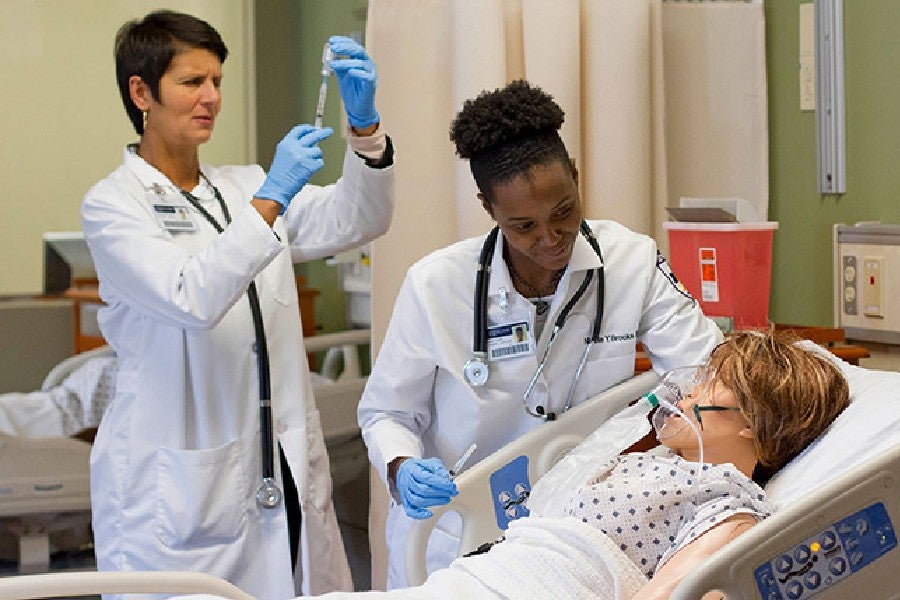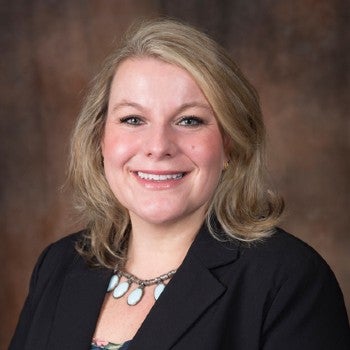Nursing’s Hesselrode sheds light on novel coronavirus making headlines across the US
The coronavirus is making headlines across the country. Learn more from one of our faculty experts.
Kim Chaudoin |

In recent days there has been much talk in the media and in communities about an illness — 2019nCov — that is being referred to as novel coronavirus, a virus that has emerged in recent weeks in Wuhan City in China. According to the Centers for Disease Control (CDC), five cases of this virus has been confirmed in the United States as of Jan. 27.
Dr. Mary Hesselrode, associate executive director for academics and assistant professor in the Lipscomb University School of Nursing, has led discussions about the virus in classes over the last week as an opportunity to teach and prepare student nurses for circumstances like this in the future. In addition to her work at Lipscomb, Hesselrode is also a nurse practitioner at Brentwood Family Care Center in Brentwood, Tennessee, where she has also discussed novel coronavirus with colleagues and patients.
Information about the virus is changing rapidly, Hesselrode says, and with that has come the spread of incorrect facts and other details about the virus. Recently, Hesselrode shared with Lipscomb Now insight on novel coronavirus to provide accurate and helpful information to the community.
LN: What is coronavirus?
Hesselrode: The coronavirus is a description of a family of viruses that cause the common cold and pneumonia symptoms. A coronavirus is commonly known to be transmitted from animal to human. Currently the World Health Organization (WHO) is working diligently to name the novel virus, but now to the healthcare community it is more accurately called (2019nCoV).
Viruses are historically named after the area of where they are found, but because of the negative perception that could be placed on the area WHO is hesitant to name it after Wuhan City, China.

Mary Hesselrode
LN: What are the symptoms of coronavirus?
Hesselrode: Symptoms are currently presenting as many viral illnesses commonly present; fever, dry cough, diarrhea and body aches. Severe symptoms have progressed into kidney failure, pneumonia and death.
LN: What can you tell us about this virus?
Hesselrode: There is still so much to learn about the virus, but currently the reports from the CDC and WHO encourage droplet precautions. Indications that the virus is being spread through close contact (six feet) of those infected by coughing, sneezing and direct contact with droplets on surfaces and similar methods. Those that have decreased immune symptoms, elderly and young children are at highest risk to have severe symptoms. At this point the Tennessee Department of Health reports 90 percent of reported cases are linked to the Wuhan City, China seafood and meat market.
LN: What does the public need to know about this illness?
Hesselrode: There is much unknown about the novel coronavirus. Follow closely travel precautions and regulations announced by the CDC. Continue general viral precautions of frequently washing hands, covering your mouth when sneezing or coughing (using the inside of your elbow), and seek medical attention with any concerns.
Currently the flu virus remains the greatest risk to public health. It is not too late to be vaccinated for the flu.
LN: What is the typical duration of the illness?
Hesselrode: This is a difficult question to answer as the patterns of duration are still being identified.
LN: Are there confirmed cases in the United States?
Hesselrode: These reports are confirmed through the CDC and WHO. As of Jan. 27 there have been confirmed cases in Arizona, Washington, California and Illinois. All five patients have direct travel links to Wuhang City, China.
LN: What can individuals do to try to protect themselves against contracting this illness?
Hesselrode: Very similar to flu and cold prevention basic hand washing and covering your mouth with the inside of your elbow when sneezing or coughing. As more is learned about the virus, and as potential viral morphing occurs these precautions may change. There is not currently a vaccine.
LN: How real is the threat of this illness being found in Nashville or spreading widely in the US?
Hesselrode: Nashville has a growing diverse population, where traveling for both professional and leisure are common. There is also a large student population with many universities centralized in one area. Because of our several large hospitals we also have people seeking treatment and care from around the nation. We are anxiously awaiting more information from WHO's investigation and will know more in the coming days and weeks as the patterns of 2019nCoV are followed.
LN: What are some credible online resources for people who want to know more?
Hesselrode: There are a number of good sources for more information including:
www.cdc.gov (public health, healthcare provider recommendations, up to date travel precautions and warnings)
www.who.int (most reliable international source with up to date trends and international news)
www.tn.gov (local healthcare provider resource and alerts provided)
LN: How is studying an outbreak such as this a good teaching opportunity for our School of Nursing students?
Hesselrode: Nurses are often on the "frontlines" of patient care and have a responsibility to the public to maintain awareness of current healthcare risks. Our nursing students are often placed in leadership positions as early as six months after graduation. Leading a team of nurses and organizing patient care requires in depth knowledge of the most up to date precautions and risks to public health.
We discussed the novel coronavirus in Nursing Leadership and Management recently to help students recognize the difference between fabricated stories that make great "news" and reliable evidence based resources. We have a responsibility to the public to maintain composure and react based on facts and not "news.”
As early as their first semester of upper level nursing courses students are in area hospitals and outpatient treatment facilities. We are monitoring the novel coronavirus trends and will make sure our students are aware of the most up to date precautions and risks.
University Health Services, led by Erin Keckley, is an on-campus resource for students with special services for faculty and staff when they have concerns about their health or need medical assistance. A variety of services are provided. For more information visit www.lipscomb.edu/student-life/health-wellness/health-center.
For more information about Lipscomb’s School of Nursing visit www.lipscomb.edu/nursing.